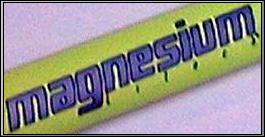|
|
|













.jpg)
.jpg)
.jpg)
.jpg)
.jpg)
.jpg)
| Chemical copmosition: | Mg (magnesium) | 94 % |
| Other additives ® | 6 % | |
| Physical properties: | Density: | 1.79 g/cm3 |
| Coefficient of thermal expansion: | 27 x 10 K | |
| Modulus of elasticity: | 43 x 103 MPa | |
| Damping index: | 2 | |
| Tensile properties: | 0.2 % proof stress: | 200-220 MPa |
| Tensile strength: | 280-320 MPa | |
| Elongation: | 8-15% | |
| Fatigue Properties (minimum values): | Unnotched: | 110 MPa (5x10 cycles) |
| Unnotched: | 140 MPa (1x10 cycles) | |
| Notched: | 100 MPa (5x10 cycles) | |
| Notched: | 110 MPa (1x10 cycles) |

 Send me an e-mail to:
mgbiker@hotmail.com
Send me an e-mail to:
mgbiker@hotmail.com